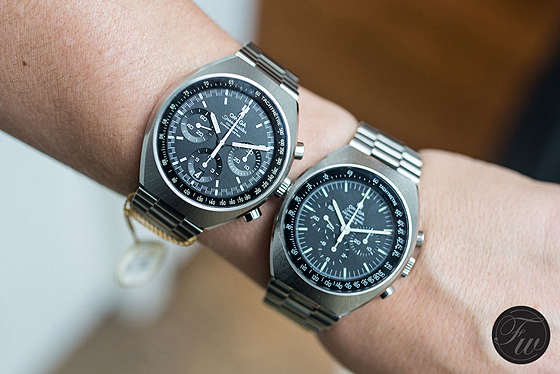-
By your description all vintage watches should be more expensive anyway then if everyone wants a vintage watch instead of a new one.
I'm not a watch expert, on this thread there's obviously some very knowledgeable people, you being one of them, but from an outsiders perspective it comes across like this:
"Enthusiasts" and "collectors" will want provenance. They look to vintage watches not because they're cheaper but they carry something special. Without putting words or even thoughts in anybody's mouth, I will wager that a % of people who wear a vintage watch of a very specific heritage or original purpose do so because they know, that other watch people who know, will know what they are wearing. So of course these watches will carry a premium.
To carry on @Dammit 's example, a 1970s 2.7 Carrera RS is worth 7 figures because it's an iconic Porsche 911. Sure, you can buy a brand new 911 GT3 RS but some people want that originality, that car from a time when cars smelt like petrol, gears whined and needed changing manually, the car moved about and required concentration to drive, and people cared about their cars.
So why are watch manufacturers making vintage looking watches? Not because some people are buying your run of the mill 1980s gold Seamaster, but because like the 7 figure 911, the proper lusted after watches are unobtainable. They're not trying to cramp the style of the buyer who is looking for a £500 bargain, they're enticing the buyer who can more than afford a brand new Omega, Rolex, or Tudor, but cannot fathom affording 18 milli for Paul Newman's Daytona.
The majority of watch purchasers, like the majority of car purchases want something new with warranty, they care not for heritage, or what ref vintage watch is worth close to 7 figures, they want to put a watch on, it to work, and if it stops working someone will fix it for free and quickly because it's an expensive watch.
If anything, to me it comes across like the more vintage style watches available new, then the less demand for vintage watches because those buyers who want something old but don't know enough to buy a good condition one successfully can just buy something new that looks like those old watches.
-
So why are watch manufacturers making vintage looking watches? Not because some people are buying your run of the mill 1980s gold Seamaster, but because like the 7 figure 911, the proper lusted after watches are unobtainable.
Broadly agree with your post. But the main reason they're making new vintage is because of fashion trends, which then leads the marketing.
Watch manufacturers are just cashing in, like Barbour or Redwing do. Most of what I've read attributes this obsession with the knock effects on from the '07 Crash. With global growth up I wonder how much it will last?
The one curve ball with watches though is how many still make "old watches";

... to continue the car analogy its a bit like the way some British car models stayed they same for 30-40yrs - see OG Range Rover, Mini, Metro, etc.
EDIT: out if curiosity I tried to search and find out when "vintage lume" started. Came across this post which I thought hit the nail on the head in many ways;
We are told over and over by marketing materials and our fellow WIS, who are essentially marketing materials themselves, that mechanical watches are supposed to last generations. That's why we're supposed to be eager to pay so much more for them than quartz.
So the lume is supposed to fade on its own over the course of our lives (spent sitting at keyboards and occasionally strolling down to wherever our lattes come from rather than fighting wars and taming the ocean depths like the characters our watches are meant to evoke). Making that lume "vintage" in the first place is an attack upon our suspension of disbelief.
 NurseHolliday
NurseHolliday hugo7
hugo7
I don’t think the car analogy is particularly helpful as new cars are obviously more reliable, faster, economical and safer than old cars; they perform their job better than the old one. This isn’t really true for watches, an old watch will do just as good a job as a new one.
So if both of the minis above functioned equally well:
Which has more character? Which is more charming?
Which has more provenance, more of a story attached to it?
Which is scarcer?
Which will be more expensive in 10 years time?
Which has a more rewarding purchase experience?
Which brings the owner more joy to own?
All the major watch brands know that they’re competing with the vintage market. So Omega using the name of an old watch somehow bestows on the new watch the same heritage identity, even though it obviously isn’t in any way the same at all. Or the little extra gifts you get (compared with the months spent building a relationship with a seller before I buy an old watch), or the artificial “scarcity” of “only” 3500 pieces and limited editions (omega still haven’t sold all their 50th or even 60th anniversary speedmasters).
I get that people know the difference between new and old, but still not why buy new. Warranty? Too fearful of buying a lemon?
Rolex and Omega sell 1 million watches a year each and still convince the public that their products are exclusive. Broadly speaking, Rolex do this by investing in their brand, and Omega by exploiting their brand.
^Just my humble opinion. YMMV. #buywhatyoulike